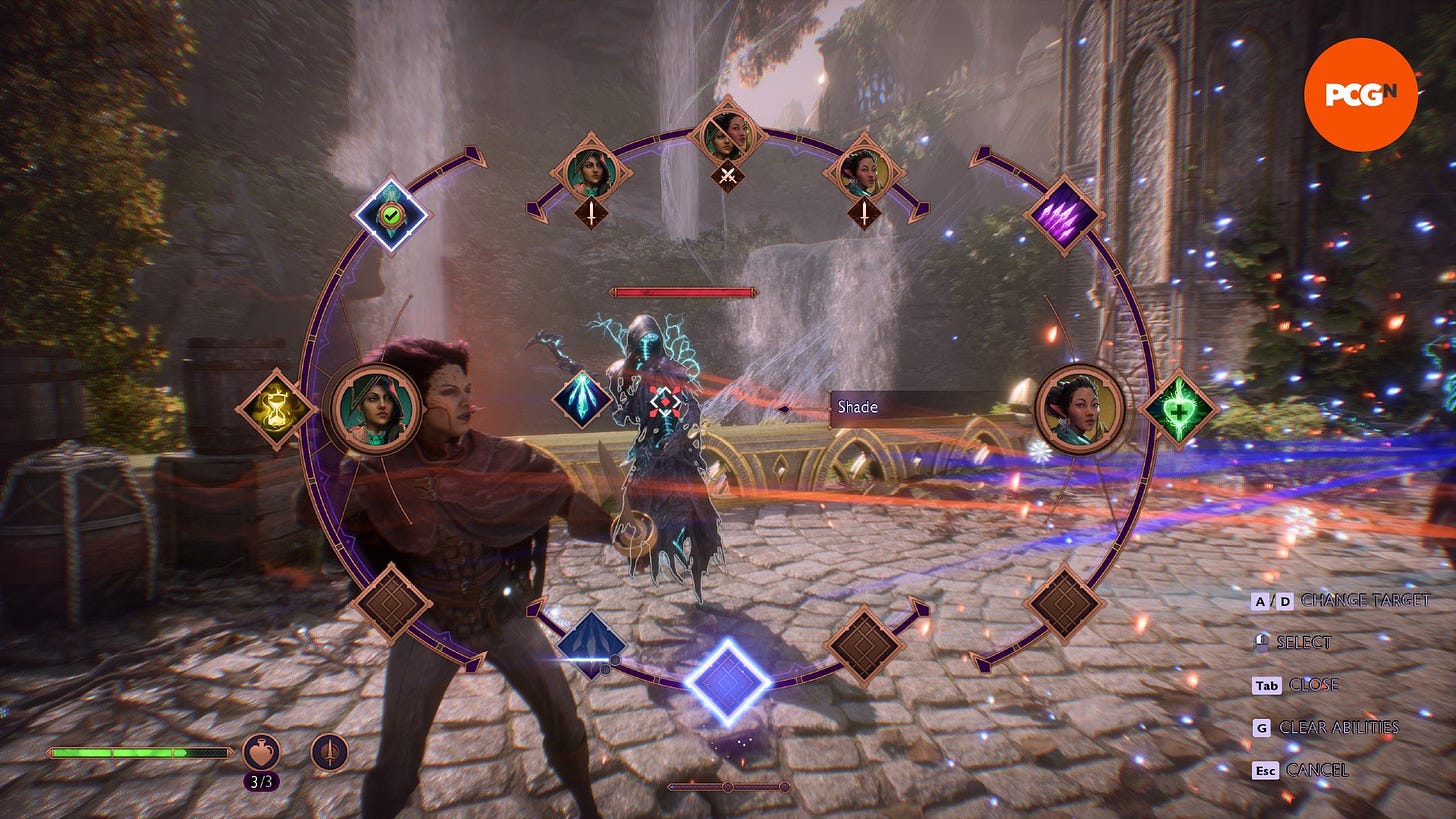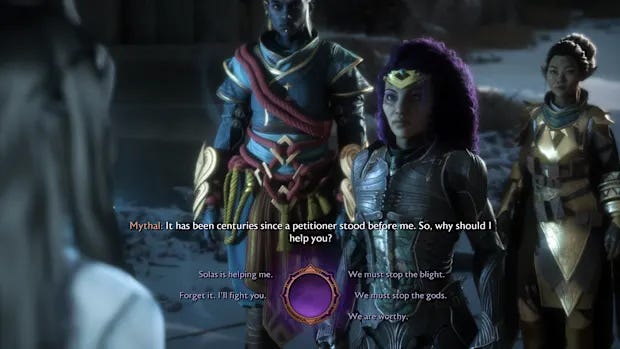Dragon Age: The Veilguard has unsheathed itself to a record player count for Electronic Arts - for how long will its tail uncoil?
EA's chantry believe the game will continue to cultivate enthusiasm, though BioWare have already set their Mass Relay for its successor.
In the latter days of the last generation, BioWare formally announced their next iteration upon the Dragon Age series - delivered through an ominous teaser punctuated with portent. Subsequently, four years and one commercial disaster passed before the studio provided an indication of the game’s textual concern: the grandiose tragedy of Solas, the Dreadwolf. External expectations were tempered, as were internal measurements; the game underwent several permutations prior to its settling upon a paradigmatic action-role-playing formula - particularly to the ire of the series’ ardent ideologues. Anthem’s failure caused EA’s top brass to further attune BioWare’s instrumentation, excising Dreadwolf’s multiplayer faculties in favour of a return to the studio’s narrative origins - Origins inclusive. Curiously, a contemporaneous piece from Bloomberg indicated EA requested BioWare to implement extensive online components in 2017, one year prior to its public unveiling. Since this revision was said to begin in 2021, the team spent a significant portion of time working upon this concept; BioWare’s live-service flatlining must have frozen their feet over with a particularly nasty incantation.
The Veilguard, erstwhile Dreadwolf, shed its coat twice over.
Electronic Arts have slowly reclaimed the latter half of their name, eminently through their EA Originals label dedicated to raising independent productions to a mainstream, commercial standing. It Takes Two, for instance, has produced 20 million sales to date - not players, straight purchases. One can envision this title alone to have remedied the removal of loot boxes from Star Wars Battlefront II. However, their EA Sports brand - ever in the game - has continued to maintain a steady stream of revenue, particularly through the challenges of a divorce from their long-time partner in FIFA. Furthermore, their rival of College Football served as a jolt of vigor to their Madden malaise, shipping 2.2 million copies in early access alone before surpassing Helldivers 2 to become the most successful game of the year. Thus, EA can afford to further delineate their storytelling ventures from their persistent publications, courting the bifurcated halves of the industry whilst capturing their cross-section - a souls-lite in the vein of Star Wars Jedi: Fallen Order reserves mainstream appeal in a similar vein to football, whilst exercising genre elements in a manner enticing to its enthusiasts.
BioWare’s last title, however, was a reprisal of the Mass Effect trilogy: a gorgeous aesthetic update, yet predicated upon existing material. Andromeda, their last original, single-player-centric title, met the sales count of Mass Effect 2 - arguably the series’ creative peak - despite failing to receive critical acclaim or audience adulation. Dragon Age’s last inquisition, furthermore, was a success, though its foundation upon EA’s proprietary Frostbite engine served as a great tribulation for the team: a third of its development time was dedicated to producing novel development tools. Concerningly, through the duration of its alpha, Inquisition did not feature a save function. Therefore, with ten years and two titles based upon Frostbite to their name, The Veilguard arrives as their most fluent expression of their contemporary toolkit to date; the game’s presentation is indeed reflective of their cumulative technical literacy.
The Veilguard’s combat schematics are lively, rendered in real-time - a full departure from Origins’ tactical tone.
With a peak player count of 70,414, The Veilguard has emerged as EA’s most successful single-player launch upon Steam - surpassing Star Wars Jedi: Survivor’s tally of 67,855. Granted, this is a meagre figure compared to Baldur’s Gate 3’s bewitching zenith of 875,343, affirming itself as the rightful successor to the CRPG throne left vacant by … BioWare’s Baldur’s Gate duology? Evidently, the studio have returned to Dragon Age’s roots, rather than their own title; this has bore relative triumph rather than existential victory. Crucially, The Veilguard’s chromatic ambition is a stark contrast to the dark fantasy miasma of its predecessors, exhibited in a 2022 anime adaptation for Netflix. Thus, though this concurrent count tells a hermetic tale worthy of a party and a paean, the game’s endurance against its coming competition is a concern; EA CEO Andrew Wilson believes it will break into the zeitgeist as the other long-awaited dragon title of this year did - though its peak of 228,585 represents a greater sense of place, if not recognition.
PC Gamer’s review of The Veilguard noted its narrative eschewed BioWare’s traditional model of moral interrogation in favour of elven leagues of a purely evil persuasion - focusing upon character interplay and mechanical fluidity rather than storytelling breadth. Indeed, its combat appears to be fast, tactile, and engaging, furthering the strides made by BioWare’s prior frostbitten titles. However, imbuing this sensibility into a narrative title with a reduced regard of texture - prioritising bold neon colours and brash illuminations - evidently suggests its conception as a synchronous, online-only title informed its ultimate delivery to an inexorable end. Furthermore, as its dialogue wheel merely provides terse indications of one’s response, it is difficult for the player to feel as though they are fully active in their role-playing. Against Baldur’s Gate 3’s more robust, traditional model of sentences, The Veilguard appears to be rather streamlined - ultimately inhibiting replayability. Though the dialogue wheel serves a faster paced, sleeker milieu in Mass Effect effectively, its employment in an esoteric, fantasy respect makes engaging with the lore further troublesome.
Please, go with the flow of the purple mist.
In spite of a switch to single-player presentation, The Veilguard appears to still bear marks of its laboured development. Whether it settles comfortably into a niche, remixing its CRPG roots against the filmic propensity of current-generation hardware, will emerge through the coming holiday season as its accessibility burgeons. BioWare’s upcoming Mass Effect, furthermore, will not receive the heightened stylisation of The Veilguard, retaining its familiar blend of hard science-fiction militarism and space oddities. Thus, the latter may be surmised as an exercise in translating the aesthetic principles of an online title to a offline genre, garnering appeal from those who desire both storytelling complexity and kinetic action. It seems to have found a notable clique on PC early; will it retain this initial enthusiasm within a blistering crucible of scrutiny?




